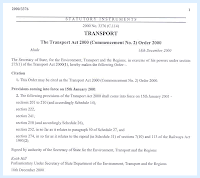Legislation can be classified as either Primary or Secondary (sometimes this latter may be described as 'delegated legislation'.)
In the United Kingdom Statutes (which may also be referred to as 'Acts of Parliament' - the terms are completely interchangeable) - are primary legislation. As "government" has become more complex, lawmakers have had to choose between getting all the rules in the Statute - the disadvantages being that Statutes would become incredbly long and difficult to read - let alone, understand - and Parliament would not have enough time to consider in detail all the provisions.
So it has become the norm that the principles and key rules are contained in the Statute. Lesser rules are not made and considered by Parliament - but the power is delegated to someone else. The advantages additionally include the fact that these secondary rulemakers may be more expert - or are closer to where the rules will apply.
At a national level powers may be delegated to Ministers.
s 11 of the Identity Documents Act 2010 says
(1)This section applies to an order under section 7(6) or 10(3)(i).
(2)An order is to be made by statutory instrument..
(3)An order may be made only if a draft of the statutory instrument containing it has been laid before, and approved by a resolution of, each House of Parliament..
(4)An order may contain incidental, supplemental, consequential or transitional provision..
s7(6) says "The Secretary of State may by order amend the definition of “identity document”" - without this provision any need to change the definition would require new legislation - which would have to go through all the stages of a bill in both Houses of Parliament. So Parliament has delegated the power to the Minister.
s11(2) states which form the secondary legislation must take - a 'statutory instrument'. All you could ever want to know about SI's can be found in the Government document available here.
The Parliamentary procedures for oversight of delegated legislation are described here. The most common procedures are the
Affirmative procedure: Both Houses of Parliament must expressly approve the SI. This may or might not involve a debate in the chambers - and the motion to approve might not be opposed - in which case no vote is taken. But when the motion comes up someone (often a whip) must should "aye" (Commons) or "content" (Lords)
Negative procedure: An SI becomes law without a debate or a vote, unless the delegated legislation is opposed. To do this an MP or Peer must "pray" against the SI. (Not on their knees, it merely means that they lay a motion to annul the SI)
skip to main |
skip to sidebar

Washminster


For everyone interested in History and also the work of Britain's Parliament; the US Congress; the European Parliament and the French Parlement. Also deals with China and the European Union. Discusses Practice, Procedure, History and current issues.
Washminster

Washminster
About Me

- J David Morgan
- Milton Keynes, United Kingdom
- Retired. An experienced lecturer, tutor and researcher with practical experience of working in the UK and European Parliaments. I have a keen academic and practical interest in the workings of both the UK Parliament and the US Congress. Over the years I have broadcast on both British and US Politics for BBC local radio stations and presented Platform:MK, Heritage:MK & Heritage Matters on Milton Keynes based Community Radio Stations.
Political Science Groups
Recommend Washminster
Search This Blog
J David Morgan

Watch
US Congress
UK Parliament
FR Parlement
European Parliament
China (Government)
London Favourites
Blog Archive
-
▼
2011
(339)
-
▼
March
(21)
- Proposed Civil Justice Reforms
- The 1983 Parliament
- Happy St Patrick's Day
- Primary and Secondary Legislation
- The 1979 Parliament
- How many Prime Ministers?
- The (October) 1974 Parliament
- Computers in the House of Lords
- Political Science Degrees in the USA
- The Rule of Law (republished)
- "You are under arrest"
- Update on "Power of Arrest in the UK"
- The Power of Arrest in the UK
- Political Humour
- Foursquare
- Plane Spotting
- The First Meeting of Congress
- Questions About Public Bill Committees
- Dr Richard Price
- Local Courts in the USA
- St David
-
▼
March
(21)
